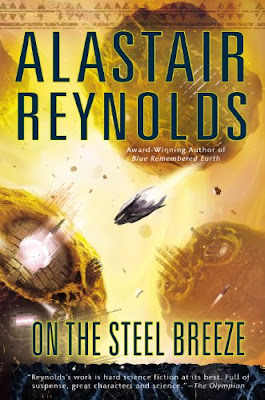I really enjoyed Blue Remembered Earth, and I really enjoyed this sequel, too. Both at times feel a bit overly long, I didn't always 100% understand what was going on (Reynolds has a tendency to focus on weird details while mentioning major plot points in passing), and sometimes there are so many balls in the air it's hard to say that Reynolds managed to juggle them all into a cohesive narrative.
Yet overall I can say I was entertained by the "yes, and" science fictional fun: vast AI networks, yes, and, personal fission through a kind of cloning and neural mapping process, yes, and, a fun romp around the solar system in search of clues, yes, and, posthumans who live underwater, yes, and, elephants being uplifted, yes, and, a human future not dominated by Europe and the US, yes, and, a flotilla of generation ships en route to another solar system, yes, and, continuation of Akinya family drama from the first book... yes, and more.
I don't need to add too much more, but I could give a mild spoiler about the personal fission. Chiku is the great granddaughter of Eunice Akinya, whose shadow falls over much of the universe of this series, even though she's not really in them (well, sort of. It's complicated.) I called the first book "Ghost Grandma in Space." I'm tempted to call this one "Ghost Grandma Goes Interstellar."
Anyway, Chiku splits herself into three, well, not clones exactly, more like she's broken down and made into three genetic replicas all of whom are given the same memories. It gets confusing, which Reynolds totally plays into by not always telling you which Chiku you're reading about. You have to pick it up from their whereabouts. One stays on Earth, another goes into deep space in search of Great Grandma, and a third goes on a long distance interstellar journey. And if that's not confusing enough, they can remotely share each other's memories in some cases, so sometimes even the Chikus don't remember which one they are!
So are they all genuinely Chiku, three persons split off from one? Or was the original Chiku destroyed, creating three new persons? Or are they just inferior copies? Or is it, as my philosophical Buddhist friends might say, totally a matter of convention because there really aren't any persons, anyway?
That's just some of the philosophical fun to be had in this book, which makes me totally forgive Reynolds for occasionally losing me along the way. Lost though I may have occasionally been, I can say I was never bored.

No comments:
Post a Comment